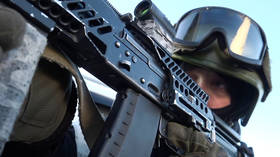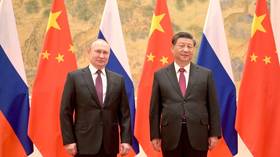Australia sanctions Russians for pushing ‘false narratives’

Australia has brought new sanctions against Russians accused of spreading “disinformation” about the conflict in Ukraine, including claims about “Nazis” in the country and civilian deaths in the Donbass region.
Canberra announced the decision on Tuesday afternoon, with Foreign Minister Marise Payne noting the new penalties will also target senior commanders in the Russian military in addition to those said to be purveying “propaganda.”
“Today Australia imposed new sanctions on key military figures, the Russian Armed Forces & those responsible for driving and disseminating Russian propaganda,” Payne said, adding that the move followed earlier penalties on key Russian banks.
Today Australia imposed new sanctions on key military figures, the Russian Armed Forces & those responsible for driving and disseminating Russian propaganda. This follows last week’s listing of key banks, to prevent finance for Putin’s unjustified war. https://t.co/pB2E9kqGOv
— Marise Payne (@MarisePayne) March 8, 2022
It remains unclear exactly how the Australian government will define ‘disinformation’, but it said it would continue to “work with digital platforms such as Facebook, Twitter and Google to take action to suspend the dissemination of content generated by Russian state media within Australia.”
While the Foreign Ministry did not release the names of those targeted, it said “10 people of strategic interest to Russia” would be sanctioned for “their role in encouraging hostility towards Ukraine and promoting pro-Kremlin propaganda” regarding Moscow’s assault on the country in late February.
“This includes driving and disseminating false narratives about the ‘de-Nazification’ of Ukraine, making erroneous allegations of genocide against ethnic Russians in eastern Ukraine, and promoting the recognition of the so-called Donetsk People’s Republic and Luhansk People’s Republic as independent,” the ministry went on.
In announcing what he called a “special military operation” in Ukraine, Russian President Vladimir Putin said the mission would aim to “denazify” the country and prevent further attacks on the Russian-speaking population in the two breakaway republics recently recognized by Moscow, which Putin characterized as “genocide” in progress. The president’s remarks about ‘Nazis’ likely refer to a number of prominent ultranationalist factions in Ukraine, some of which have received official endorsement by the government in Kiev, and have even been directly integrated into the country’s armed forces.
According to the Organization for Security and Cooperation in Europe (OSCE), thousands of civilians in the Donbass region have been killed in fighting between Ukrainian and separatist forces since hostilities broke out in 2014.













